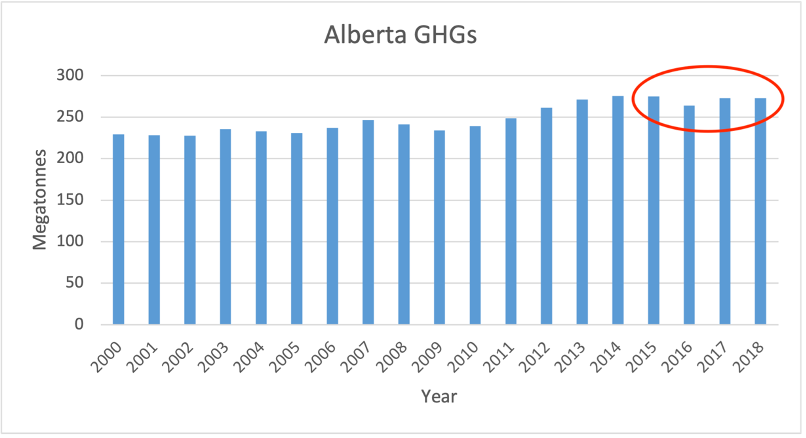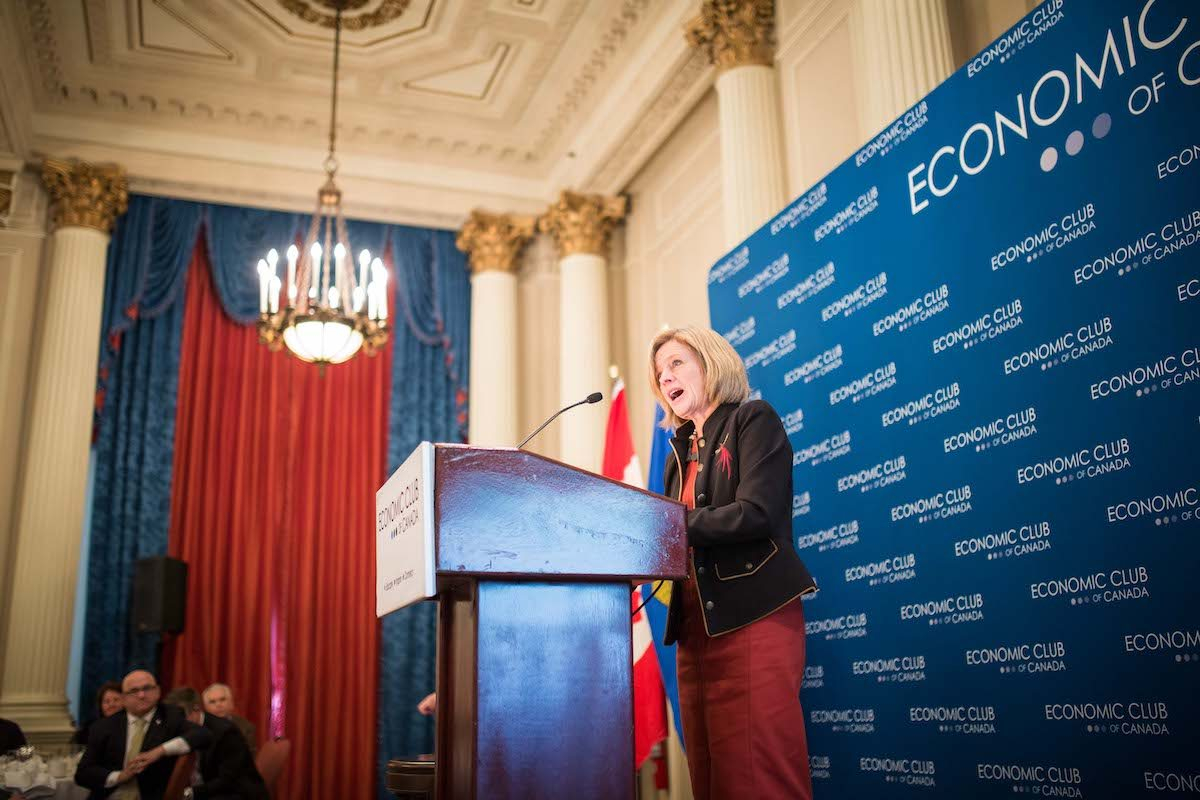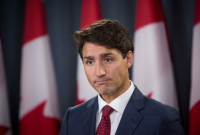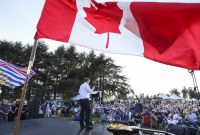Support strong Canadian climate journalism for 2025
Two years ago, with the right reunited and back in government in Alberta, led by a triumphant Jason Kenney, it seemed hard to imagine the Alberta NDP returning to government any time soon. But in a stunning turnaround, the prospect of Rachel Notley’s NDP being re-elected in 2023 no longer seems at all far-fetched.
While most Canadian premiers have seen a rise in their popularity during the pandemic, Kenney’s has plummeted, with his approval ratings currently the third lowest among Canada’s premiers. As of late 2020, the Alberta NDP had surpassed Kenney’s United Conservative Party in opinion polls. More recently, the NDP has secured a commanding lead.
Some of this is a tribute to Notley, whose comparative appeal and defence of public services is winning some folks back. On the whole, however, what is unfolding in Alberta is a remarkable own-goal by Kenney. Persisting with ideological program cuts even in the face of the pandemic, Kenney’s stubborn adherence to a right-wing agenda is not going over well among Albertans.
I would dearly welcome the return of an Alberta NDP government in 2023. But as someone who is deeply anxious about the climate emergency, I also wonder whether a second Notley government would be prepared to tackle the climate crisis more aggressively than during its first incarnation. Might the NDP, eight years after their first election to government, be able to tell a more forthright story to Albertans about the future of oil and gas? And equally important, has the terrain sufficiently shifted such that enough Albertans might be ready to hear it?
The Notley climate record
Like all federal and provincial governments in Canada, the Notley NDP government (2015-19) advanced a contradictory climate policy. We are living in a time of deep disconnection — a harrowing void between what is scientifically/ecologically necessary and what our politics seems prepared to entertain. We elect governments that promise climate action, they deliver underwhelming and inconsistent policies, and then get replaced by right-wing governments that undo what little progress we’ve seen. This has been the Canadian story of the last three lost decades.
The Notley government released its climate plan with great fanfare in November 2015. It included the introduction of a carbon tax and a commitment to phase out coal-fired electricity by 2030. At the same time, it permitted a 40 per cent increase in oilsands emissions. Notley was keen to appease the fossil fuel corporations, and she relentlessly pursued new bitumen pipeline capacity.
The Notley plan rightly gained kudos for its accelerated phaseout of coal. But of the 18 coal-fired electricity generators, all but three are being converted to natural gas, another fossil fuel. On a brighter note, Alberta has seen a flourishing of renewable electricity projects, including the largest solar farm in Canada, and is now predicted to lead the country in the growth of renewables.
Ultimately, climate plans and policies should be judged on the basis of what they achieve with respect to actual greenhouse gas emission reductions. The accompanying chart shows Alberta’s GHG emissions from the year 2000 to 2018 (the last year for which we have data), with the Notley years in government circled in red.

Note that this chart only captures domestic emissions. So it includes GHGs emitted from the extraction and production of oil and gas in Alberta. But it does not include the GHGs from all the Alberta fossil fuels exported and burned somewhere else, which are massive (nearly as high as Canada’s total domestic emissions).
Two truths are revealed by this chart. First, the Notley government’s climate record was certainly better than the previous half-decade. The NDP (along with slumping international oil prices) managed to stem the rise in emissions and level off the province’s GHGs.
Second, Alberta’s plateaued GHG emissions remain at a historic high, and if that trajectory continues we’re in big trouble. Given that Alberta, as of 2018, accounts for 38 per cent of Canada’s total domestic GHG emissions, were the province to persist in merely flatlining its emissions, the task of the country as a whole meeting its climate targets becomes virtually impossible.
From these two truths emerge two further conclusions. First, if and when the NDP are re-elected, we need them to do better. Much better. And second, the rest of Canada should feel powerfully compelled to assist Alberta in that task — we all need to help Alberta bend the curve.
The oil and gas industry does not represent a huge share of Canada’s overall GDP. But that’s not true in Alberta, where in recent years that sector has accounted for roughly a third of economic activity and about seven per cent of employment. That makes climate action particularly challenging in Alberta. If an Alberta government is to do what we all need them to do, the federal government needs to offer substantial and concrete assistance.
I have proposed the feds do so with a new transfer program — a Climate Emergency Just Transition Transfer (as I outlined in this Observer piece, co-authored with Alberta Federation of Labour president Gil McGowan), and I’d encourage the Alberta NDP to lead the call for such a program. The federal transfer could be specifically linked to funding climate infrastructure and renewable energy projects that would create thousands of jobs, along with training/apprenticeships. It could be a mechanism to renew confederation while rising to the climate crisis.
The amount of the federal transfer should be audacious — something in the order of $20-40 billion a year for the next 10 years. But unlike most federal transfers, which allocate funding by population, this transfer’s distribution formula should be linked to GHG emissions in each province (but fixed from that point onward, so that it does not perversely incentivize continued high GHGs). As Alberta currently produces 38 per cent of Canada’s GHG emissions, it would receive 38 per cent of the transfer money. This scale of support would mean just transition would not be the hollow promise of the past, but a concrete offer of billions of dollars and real investment. It should include a good jobs guarantee for fossil fuel workers and those in impacted communities. An innovation such as this could be a linchpin within an overall transition plan that is fair and just.
But are Albertans ready for a new conversation on the future of oil and gas? That’s the subject of Part 2 tomorrow.






Comments
Hmm. Do we transfer $$ to Alberta with or without ‘strings’? Protecting workers sounds fair but does it mean ‘at the level to which I have become accustomed’? And by ‘workers’ you could substitute ‘shareholders’ as well.
Hi Graham. Yes, absolutely with springs. The proposal for a new transfer is more fully outlined here: https://www.nationalobserver.com/2019/11/30/opinion/renewing-confederat…
I don't think the money should just be transferred to the provincial govt, but rather, to a new Just Transition Agency, jointly governed by levels of government, including municipal and Indigenous governments, and with climate experts and labour and business people on the board. And I think in order for this to fly, as a quid pro quo, Alberta will need to institute sales and income taxes that align with the rest of the country.
Seth Klein: "Alberta … is now predicted to lead the country in the growth of renewables."
Watch out for spin. AB is predicted to lead the country in the growth of renewables only because it is at the back of the pack. At the bottom of the list. Starting out from near zero. Most other provinces are far ahead in renewable capacity. (Admittedly, most of this is hydropower.)
AB and Saskatchewan are not leaders but laggards, with a lot of catching up to do.
"The home of Canada's energy sector is set to outpace the country in renewables growth: forecast"
https://www.cbc.ca/news/politics/alberta-oilpatch-energy-renewable-1.59…
The UCP has always been more popular than its leader, Jason Kenney.
Kenney's relative unpopularity did not prevent a UCP landslide in 2019.
Rural voters remain staunchly conservative. They have not yet embraced the NDP — nor will they ever.
Some disappointed UCP voters may stay home next time, but life-long conservatives will never mark their x beside the NDP candidate's name.
Unless all of Calgary and the smaller urban centres swing orange, the NDP does not stand a chance.
Seth Klein: "I also wonder whether a second Notley government would be prepared to tackle the climate crisis more aggressively than during its first incarnation."
Such a hope profoundly misreads Rachel Notley.
Notley and her backroom advisers then (Brian Topp) and now spectacularly failed to address the issue of our time — but not out of timidity. Not for electoral reasons, either. The NDP never stood a chance against a united conservative party. Still don't.
No doubt Notley & Co.'s embrace of neoliberal petro-politics was genuine. Just as Notley's climate change denial is "genuine". No one of sound mind can understand climate science and truly appreciate the perils before us — and still push pipelines, i.e., climate disaster.
Notley and the AB NDP are truly in the grip of Big Oil and at its service. Notley does not have a green bone in her body — it's a profound mistake to suppose otherwise.
"the Notley NDP government (2015-19) advanced a contradictory climate policy"
No, what the NDP advanced very successfully is Big Oil's agenda to expand production and markets — and fail on climate action. Corporate Canada is banking on business-as-usual emissions scenarios where the world is still burning 100+ million barrels per day decades hence. The only scenario in which oilsands expansion makes sense.
Notley had no plan to bend the curve on AB oil production, or initiate a "just transition" for oil workers, much less get AB off oil. Under the NDP "climate plan", AB's emissions would likely go up, not down.
The Liberals and AB NDP have proved far more effective than the Conservatives in delivering on Big Oil's and Corporate Canada's agenda. Trudeau & Co. have persuaded many Canadians that we can both act on climate and double down on fossil fuels. Trudeau and Notley moved the ball on the Trans Mountain pipeline down to the ten-yard line. Their signal achievement was to "push country-wide support for pipelines from 40 per cent to 70 per cent." Something Harper, Scheer, and Kenney could never dream of doing.
Tiny carbon taxes, coal phase-out, fraudulent emissions caps, and "free" LED bulbs were smoke and mirrors. A fig leaf. A cynical quid pro quo for new pipelines.
Big Oil is fine with a low carbon tax that has no real effect and does not hurt its bottom line. Especially if they can trade it for new export pipelines that enable oilsands expansion.
The fraudulent oilsands 100+ Mt emissions cap allowed for emissions 43% higher than 2015's under-reported levels. Plenty of exemptions boosted the nominal cap. Total oilsands emissions including projects that are under construction, have received approval, or are seeking approval "blow well past" AB's cap. (Pembina Institute)
All diversions from the main agenda, namely, oilsands expansion at all costs. Which will prevent Canada from meeting its inadequate emissions targets for decades.
Notley further undermined NDP credibility on climate by hinging her support for a federal carbon tax in exchange for pipelines.
After the Federal Court 2018 ruling on TMX, Notley pulled her support for a national "floor price" on carbon.
Tzeporah Berman: “The courts ruled in favour of indigenous rights and acknowledged the risk to the dwindling Orca population and so Notley … pulls out of the climate plan? What?! We are going to acknowledge indigenous rights and protect the whales? Well screw the climate then."
Notley's NDP relentlessly attacked environmentalists and pipeline opponents. By the end of term, she had bought into Vivian Krause's absurd fantasies:
"'I’m frustrated by it, of course,' Notley says of the [anti-oilsands] campaign. 'Vivian Krause (the B.C. researcher) and people like her have done a good job of really laying bare the details of this and really showing us the degree to which this had been going on and building over time.'"
Must-listen podcasts:
1) Forgotten Corner's appalling interview with former NDP Env Minister Shannon Phillips (Forgotten Corner podcast).
https://www.forgottencornerpod.com/episodes/episode-2
2) Alberta Advantage podcast eviscerates Phillips and the AB NDP.
https://albertaadvantagepod.com/2020/06/02/fear-of-a-green-new-deal/
Seth Klein: "If an Alberta government is to do what we all need them to do, the federal government needs to offer substantial and concrete assistance."
Trudeau's Liberals are as much in the grip of Corporate Canada's agenda as the AB NDP. Anybody hoping for climate leadership from Notley or the PMO — corporate Canada's front office — is going to be grievously disappointed.
I have to agree Geoffrey Pounder. Born and raised in Alberta, I am more than aware of the culture there (I don't live there any longer, whew!). Just as Notley did not take the opportunity to make some serious and courageous advances in social policy in Alberta when she was premier (like increasing the stock of social housing - badly needed), she did cater to the oil and gas industry. Why? Because all eyes were on winning the next election. So typical of the main stream parties (Conservative, Liberal, NDP). As I watch the two-faced NDP government in BC play it's destructive games with environmental destruction (Site C, LNG, logging of old growth forests) and climate change, the chances of Notley in Alberta being courageous enough to be daring in addressing the issue in Alberta is pretty remote. Even on the federal level the NDP has spotty policy statements about climate change but nothing like an actual plan. It's pathetic. If I want action on environmental destruction and climate change, voting NDP is a wasted vote.
I have to agree Geoffrey Pounder. Born and raised in Alberta, I am more than aware of the culture there (I don't live there any longer, whew!). Just as Notley did not take the opportunity to make some serious and courageous advances in social policy in Alberta when she was premier (like increasing the stock of social housing - badly needed), she did cater to the oil and gas industry. Why? Because all eyes were on winning the next election. So typical of the main stream parties (Conservative, Liberal, NDP). As I watch the two-faced NDP government in BC play it's destructive games with environmental destruction (Site C, LNG, logging of old growth forests) and climate change, the chances of Notley being courageous enough to be daring in addressing the issue in Alberta is pretty remote. Even on the federal level the NDP has spotty policy statements about climate change but nothing like an actual plan. It's pathetic. If I want action on environmental destruction and climate change, voting NDP is a wasted vote.
I fear Geoffrey Pounder's comments are all too accurate.
As an ex-Albertan I would never want to see that kind of public money being funnelled into that province to fix a problem it refuses to fix itself.
Alberta failed to save enough from its 70-years of oil wealth, choosing to spend it like drunken oil workers not just on trinkets -- the favourite being freeways -- but on core public services. Most other advanced economies underpin healthcare and other core public programs with tax revenue. How smart is paying for core services with funding from non-renewable natural resources that are traditionally subject to outside economic forces and boom & bust cycles? Does Alberta take Canada as a bunch of idiots while it not only gleefully pockets so many political donations from oil industry personnel, but follows their biased instructions to a T in regulation and reaches into oil company executive management to extract board members exclusively for government cabinet seats?
Then there are the environmental liabilities that could cost upwards of $400 billion to remediate, likely not entirely satisfactorily at that. Alberta would love to have $40B a year coming in from the rest of Canada as a reward for their failure to practice life cycle accounting and to parcel off an adequate piece of the Golden Goose into better quality and much larger savings accounts and adequate cleanup funds.
When Alberta enacts a standard sales tax and other typical tax measures common in all other provinces and the federal government to support public services, then it can talk to the rest of Canada, but not to the ridiculous tune of $40B a year. There is a certain naiveté about that idea.
Klein couches all this as fighting climate change. The evidence is that Alberta will not fight climate change in good faith no matter which party is in power. Just as the cities of Burnaby or Vancouver how they feel about Rachel Notley and TMX. The evidence is that there may be a better chance of success in lowering emissions by further encouraging the diversion of international investment funds away from the oil sands and instead into electric vehicles and their batteries, and invest national public funds into a national smart grid, grants for home and commercial building energy conversions, and directly into renewables and mass liquid metal grid-scale battery storage.
Let Alberta stew in its own juices while figuring out how to help itself catch up to a changing world, just like the rest of us. Seth Klein and his sibling, Naomi, have a penchant to put politics ahead of science and economics. The NDP will not save Alberta, but sound science and full accountancy financial planning will.